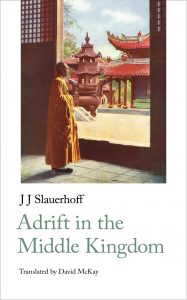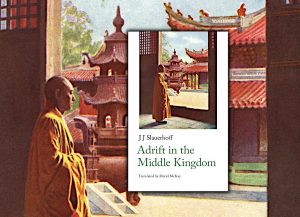Adrift in the Middle Kingdom by J. Slauerhoff (Translated by David McKay)
“There is no better place on earth to live for a man tormented by his fate and threatened by those demons, like you. Try never to stay in one place; move from city to city, resting your wearing body in the inns and your weary soul in the monasteries. Wherever you go, you will be recognised as my kin and given shelter.”
Adrift In The Middle Kingdom is a 1934 novel by Jan Jacob Slauerhoff, a Dutch-language writer who travelled around south-east Asia serving as a ship’s doctor. Inspired by Slauerhoff’s own experiences of existential dread and his travels in China, the novel follows Cameron, a ship’s radio operator who flees from the see in order to find some kind of meaning to his life and travels through Taihai – 1920s Shanghai – and into mainland China to the fictional city of Chungking. As such it is a curious mixture of detailed travel writing inspired by Slauerhoff’s lived experiences in China, and fictional adventure that merges increasingly into existential fantasy as the novel reaches its transcendental conclusion. Handheld Press have brought Slauerhoff’s novel out in English for the first time, translated by 2018 Vondel Prize-winning translator David McKay, bringing this unique novel to a new audience.
 The introductions to Handheld Press’s books are always fascinating and thoroughly researched, but I especially recommend reading both of the introductions to Adrift In The Middle Kingdom, by Slauerhoff expert Arie Pos and Wendy Gan of the University of Hong Kong, before reading the novel itself. Both provide crucial context about Slauerhoff’s life and depictions of China in European early 20th century literature, which the average reader may not be aware of. Slauerhoff’s own search for meaning in life, plus the way he merges the real and the imagined throughout the text, shed light on what makes this such a compelling and unusual text. Adrift In The Middle Kingdom operates both as a depiction of China in between the World Wars and an existential meditation on engagement with earthly pleasures versus enlightenment. Slauerhoff positions China as an idyllic, enlightened culture constantly under threat of the corrupting influences of Western modernism. Cameron’s unease with modernist existence is assuaged by his journey into the heart of China, but only temporarily – he is aware that he carries the seeds of destruction with him, and so his attempts to grasp the divine are ultimately futile. Running as a thread through this all is opium and the poppy, the sordidness of the drug trade, addiction and death always underlying any temporary relief it might offer.
The introductions to Handheld Press’s books are always fascinating and thoroughly researched, but I especially recommend reading both of the introductions to Adrift In The Middle Kingdom, by Slauerhoff expert Arie Pos and Wendy Gan of the University of Hong Kong, before reading the novel itself. Both provide crucial context about Slauerhoff’s life and depictions of China in European early 20th century literature, which the average reader may not be aware of. Slauerhoff’s own search for meaning in life, plus the way he merges the real and the imagined throughout the text, shed light on what makes this such a compelling and unusual text. Adrift In The Middle Kingdom operates both as a depiction of China in between the World Wars and an existential meditation on engagement with earthly pleasures versus enlightenment. Slauerhoff positions China as an idyllic, enlightened culture constantly under threat of the corrupting influences of Western modernism. Cameron’s unease with modernist existence is assuaged by his journey into the heart of China, but only temporarily – he is aware that he carries the seeds of destruction with him, and so his attempts to grasp the divine are ultimately futile. Running as a thread through this all is opium and the poppy, the sordidness of the drug trade, addiction and death always underlying any temporary relief it might offer.
Slauerhoff’s depiction of China is gritty and uncompromising. From the beginning, where Chinese rowers try to prostitute their daughter to Cameron when he pays them to ferry him from his ship to the shore, Slauerhoff is aware of the darker side of the Western influence in China. In Taihai he shows how the rich merchant class of Europeans who are benefiting from exporting China’s material wealth have set themselves up in huge mansions, whilst the local people are forced into slums. We see first hand how the civil unrest caused between the foreign-supported warlords and the communist revolutionaries leads to the displacement of the Chinese working class, and the death of a watchmaker’s daughter from disease and lack of access to medicine and sanitation. Cameron is only able to visit the interior of China by joining a gun-runner’s caravan, which travels through the flooded villages and sells rice to the starving villagers at exorbitant prices. Throughout all the human misery that he catalogues, though he shares occasionally in his fellow humans’ pain, for the most part Cameron remains detached, his inability to engage with the world around him driving him ever onward on his quest for some kind of meaning. All the suffering and pain he sees only underscores the meaninglessness of his own existence.
Although Cameron is critical of the Western influence in China and the effects modernism is having on the countryside and its people, he is unable to extricate himself from it. When he reaches the city of Chungking, closed off to Westerners for centuries, the other members of the caravan are absorbed and consumed by the ancient city, the existential threat they and their modern armaments pose to the city’s way of life neutralised by the city’s implacable ancient culture. However, Cameron winds up making a working radio set for the Tuchun, bringing the noises and voices of European culture into the city for the first time and shattering its previous existence as much as if the voices he summons from the air were the result of demons. He also discovers an oil well while the coolies are digging water wells, which ultimately floods the city with oil, brings down the ancient defensive walls, and will inevitably result in Western interest and capital pouring into the city.
Adrift In The Middle Kingdom is haunted by the spectre of the opium trade. Opium smuggling provides the funds that finance the gun-runner Hsui’s empire, part and parcel of his exploitation of and cruelty to the Chinese people, and it is in his opium den that he recruits Cameron and the other outcasts who make up his retinue, in particular Sylvain, whose opium addiction is compared and contrasted with Cameron’s detachment from life. Cameron is enticed by the relief from reality that opium brings, but like all earthly pleasures they ultimately disgust him. Sylvain’s only desire is to smoke himself to oblivion, an end he ultimately achieves, sinking from a high ranking official to a drug-addled wreck willing to do anything no matter how sordid for his next fix.
The novel shifts into fantasy and spiritual meditation in its epilogue, in which Cameron passes beyond barriers of life and death. At first, in a continuation of his mortal quest, he follows the monk Wan Chen on the path to enlightenment, but is ultimately snared by the earthly pleasures he is so disgusted by – sexuality and opium, as he becomes trapped in the Western paradise making love to an ethereal woman in a field of poppies. He escapes but is unable to achieve enlightenment with Wan Chen and instead is doomed to wander China as a shade, locked out of both iterations of paradise, but still futilely searching for some kind of meaning. In this powerful and dreamlike ending, Cameron’s journey, and perhaps all of our journeys on earth, are revealed to be thwarted quests for something always hanging just out of reach.
As with all of Handheld Press’s releases, as well as the informative introductions, Adrift In The Middle Kingdom comes with a beautiful cover and extensive footnotes that clarify any of the context not made clear by the introductions.

